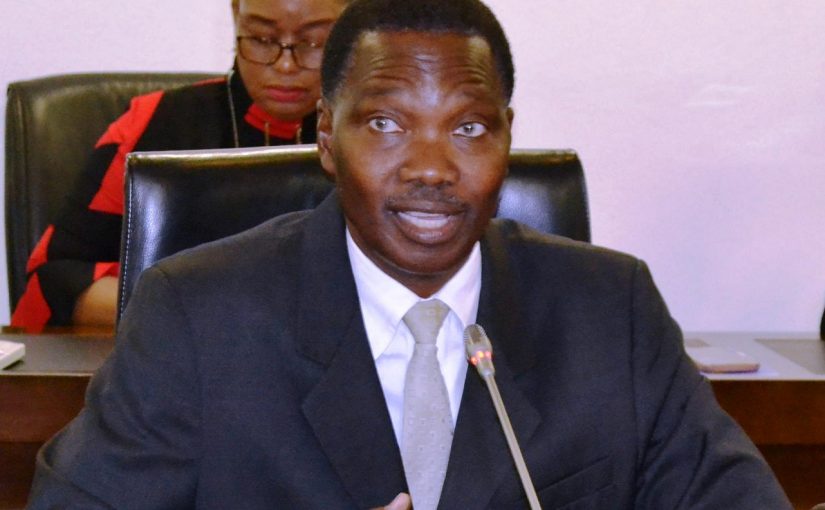Mozambique: Public spending falls 4.7% up to September
No date for new system, admits Central Bank governor

Photo: Magazine Independente
The governor of the Bank of Mozambique, Rogerio Zandamela, on Tuesday broke his silence on the collapse of the system for handling electronic transactions, but could give no date for when a new system will be up and running.
Speaking to the Plan and Budget Commission of the country’s parliament, the Assembly of the Republic, Zandamela said resuming negotiations with Bizfirst, the Portuguese provider of the computer software used to process electronic transactions up until last Thursday was out of the question.
Bizfirst is in an acrimonious dispute with SIMO (Mozambique Interbanking Company), which runs the network used by most of the banks to handle electronic transactions. Bizfirst claims that SIMO (which is 51 per cent owned by the Bank of Mozambique) has not paid the licence fee to use the Bizfirst software for the past two years, and so, as from Friday morning, it cut Mozambique off.
That meant that all debit cards issued by the banks in the SIMO network stopped working, as did their ATMs and their POS (Point of Sale) card readers. Suddenly, clients of these banks found that the only way to withdraw money was to queue up at a bank branch, as if they had travelled back in time for two or three decades.
Fortunately, the largest of the commercial banks, the Millennium-BIM (International Bank of Mozambique), was never tied into the SIMO network. As a result BIM cards and ATM machines are working normally.
But the crisis in the other banks was a body blow to the Mozambican economy: according to SIMO’s figures, before the electronic blackout, its network was handling 465,000 domestic and 14,000 overseas transactions a day.
Zandamela dismissed Bizfirst as a small company, whose only significant client was Mozambique. Judging by the Bizfirst website, which does not contain a list of clients, this may well be true, and is supported by one prominent Mozambican who worked in Portugal for several years on computer applications, and says he never heard of Bizfirst – but it raises the question of why SIMO and the Bank of Mozambique ever chose to do business with Bizfirst. Another unanswered question is how Bizfirst could afford to cut off SIMO, if the Mozambican system was its only meaningful client.
At a press conference on Sunday, SIMO chairperson Gertrudes Tovela accused Bizfirst of blackmailing SIMO. Zandamela went much further, and accused the Portuguese company of hacking.
“When we became aware of Bizfirst’s cyber-attacks, we quickly thought of a contingency plan. And that plan consisted of being prepared with the necessary IT platforms so that in the event of a blackout, we would be in a position to quickly introduce the new systems,” he said.
He did not offer evidence of this hacking, or give any reason why Bizfirst should attack its major client.
Zandamela assured the parliamentary commission that there are enough banknotes and coins in circulation to meet demand, and more could be brought out of stock as needed. The banks (including the Bank of Mozambique itself) have extended their working hours, and have relaxed the normal administrative procedures for withdrawing cash (in other words, they have suspended the commission normally charged on cash withdrawals).
He admitted that the situation for Mozambicans abroad, who suddenly find that their debit cards are being declined, is critical. Matters will be eased somewhat for those travelling now, since the central bank has raised the limit on the amount of foreign exchange that can be taken out of the country from 5,000 to 10,000 US dollars.
The only suggestion Zandamela had for those already outside the country was that they could make bank transfers via the Internet. He added that the Bank of Mozambique has instructed commercial banks to open priority lines for customers outside the country.
New software providers will arrive in the country later this week to reactivate the SIMO system, but Zandamela did not name them. As for when the system would be operational, he did not make any promises beyond “within the coming weeks”.
But the Xmas and New Year holidays are also in “the coming weeks”, and if the debit cards and ATMs are not working by then, shops and consumers alike will face major difficulties.
“I cannot give dates as to when the problem will be solved. Only the technicians who work in this area can answer this question, once they are here to evaluate and to see how much time will be needed to reactivate the system,” Zandamela said.












Leave a Reply
1 Comment on "No date for new system, admits Central Bank governor"
You must be logged in to post a comment.
You must be logged in to post a comment.